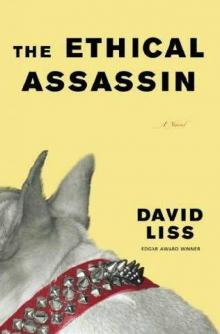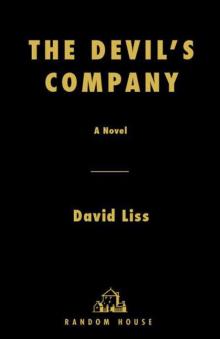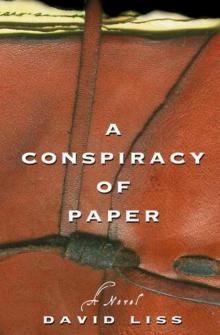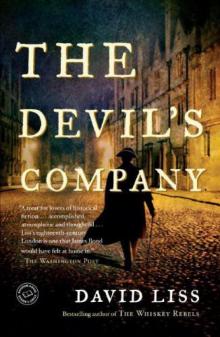- Home
- David Liss
The Day of Atonement Page 14
The Day of Atonement Read online
Page 14
“I am sure you understand,” Luis said, in a more conciliatory tone, “that the wheels of commerce must turn with all deliberation if they are to keep turning at all. My son can little afford to give you credit until your worth is established.”
“My father’s way of business served him well for many years,” Eusebio said. In other words, it was a way of doing business that kept him solvent and out of debt. Dismissed, I rose, thanked both the Nobrezas, and went back over to the barman. I drained my glass of port and ordered another as I considered my options. There were none and unless I could find a man more desperate to lend money, I would have to grow used to the idea that I would not be leaving Lisbon any time soon.
Chapter 12
I now found myself in the awkward position of courting projects but with no money to invest and courting investors while commanding no projects, but I had no choice other than to hope the timing of each effort would resolve favorably. I returned to Inácio, hoping for the name of another New Christian, since Eusebio was unwilling to do business. Inácio merely shook his head.
“They are all fearful,” he said. “You know how it is with them. Take my advice. Go back to that taberna. Spend some time. Spend some money. Get Nobreza to trust you. You won’t find a better prospect.”
I consulted with Settwell, who agreed that Eusebio was a good prospect, though perhaps not the man he would have chosen first. Nevertheless, Settwell thought it better to stick with Eusebio now that I had approached him, lest I appear fickle. I tested the waters with Kingsley Franklin as well as he sat eating his dinner in the common room of his inn. Franklin leaned back and placed his hand on his great stomach.
“I envy you, young sir,” he said. “Striking up new business, making conquests. The money. The whores.”
“There are no whores involved in my question,” I said. “I wish only to know if you are familiar with Nobreza.”
“I did business with the father,” Franklin said. “He was always dependable. The son was a bit weak, but that could serve your interests. If you are looking for someone to bend to your will, he might be your man.”
I returned to the New Christian taberna, and though Eusebio still showed no interest in doing business, after a week or two he did regard me with a friendly smile and a nod. It was little enough progress, and I wanted more, so I was encouraged when, two weeks after our initial meeting, I received an invitation from Rutherford Carver to meet him at the Three Speckled Hens to discuss possible uses for my ready money—should I secure a loan and find myself in possession of any.
Making my way through the crowded coffeehouse, I found the Carvers sitting alone at a table, drinking wine and discussing a story in a London newspaper—one fairly well used and evidently rather old. With one hand Mr. Carver wiped his perspiring brow with a handkerchief while waving the other through the air as he articulated some point. His wife nodded, giving him her full attention.
Mrs. Carver looked, if anything, more striking than I recalled. She wore an ivory gown, cut low in the front to expose a generous swath of her creamy bosom. Atop her head sat an undersized hat, like something one would find upon a child’s doll, and under that, her orange hair spilled out upon the shoulders of the gown like wine upon a tablecloth.
I bowed to them, and they invited me to sit. Mr. Carver poured me a glass of wine. “So very grand to see you again, Mr. Foxx. How are you liking Lisbon?”
“I like it very much,” I said, “though I am ready to begin making some money.”
“Spoken like a true man of business,” Carver said, laughing heartily as though he had said something extraordinarily clever. His pale face reddened with the effort, and his eyes moistened. “I do advise patience. These things can’t be rushed. You must establish yourself first, though a man such as you, with property, need not be in any hurry.”
“I should describe myself as eager, not hurried,” I said.
“The game of it!” He laughed again and slapped his hand upon the table. “The thrill of the hunt, eh? I know your mind, sir. I know it like I know my own. But you must wait until you are established. That is the thing here, sir. Reputation. Name. These are the sum of the Factory man.”
I laughed politely along with Rutherford, even as I observed, from the corner of my eye, how Mrs. Carver turned her pretty face away, her pale skin flushing. Did her husband embarrass her, or did she merely wish to create the illusion that he did?
“Tell me, sir,” I said, once all the laughter about nothing had died down, “how can I establish myself when everyone waits until I am established? It is a bit of a paradox, is it not?”
Mr. Carver spread his hands, as though the great mystery had just unfolded itself before us. “A vida em Lisboa,” he intoned in utterly unaccented Portuguese. “That is life in Lisbon.”
Mrs. Carver turned to me, her movements languid and unconcerned. “It is the difficulty all new men find. You will have to be bold. That is what separates the successful merchants from the ones who grow weary of the effort and slink back to England. Are you bold, Mr. Foxx?”
“I hope I am bold enough,” I answered.
“Have you found yourself a Jew yet?” Mr. Carver asked. “That is the way, as I’ve told you.”
“I have begun to build some contacts there,” I said, leaning back like a man pleased with himself.
“Contacts are easy,” Mr. Carver said. “Any man might strike up a conversation. It is the substance, sir.” Here he drove his index finger toward the ceiling. “The substance is what matters. With whom have you been speaking?”
I told him about Eusebio, and Carver nodded, his ebullience somewhat diminished in the face of real business. “A solid enough man. I know of him. He does not have the fattest purse in the city, and he tends toward caution. Trying to get out of his father’s shadow, but he’s afraid to strike out alone. You know, his father was the most useful Jew in the city once. There wasn’t a soul in Lisbon better able to convert gold to notes and back again.”
Mr. Carver now had my full attention. According to Settwell, my father had been deceived by a scheme involving the conversion of gold to notes. Of course, many men engaged in such practices, and there would always be those among the New Christians who would need conversion to export their wealth. Even so, this was a fact worth noting.
“Do you think the younger Nobreza is of no value?” I asked.
“If he lends you money,” said Mr. Carver, “that is value enough.”
“Since our own arrival in Lisbon,” Mrs. Carver said, “we have made something of a business in dealing with new men. We well recall the difficulty of our first few months, and we have found it profitable to seek out those whom others are yet to trust and get their money first.”
“Are you proposing a venture?” I asked.
“We are,” Mr. Carver said. He finished his glass of wine and stood. “Dependent upon your having funds, of course. I should love to tell you more, but the consul has requested a meeting with me, and I do not wish to make him wait.” Here he giggled, though at what I could not have said, and observing that nothing amusing had transpired would have been rude. “I leave you now in my wife’s capable hands.”
I rose and shook his hand, doing my best to hide my annoyance. The man had invited me, and now he hastily departed. In fact, their scheming was so overt that even I, someone who earned my bread through trickery and pretense, found it hard to play the part of the innocent. It was likely this scheme had worked before. How could a new man, such as I pretended to be, resist the twin allures of established trade and a beautiful woman?
When Mr. Carver was gone, I sat down once again with his wife.
“We are very fortunate to have the consul’s attention,” she told me, turning her face away prettily, showing me the appealing lines of her profile.
“I do not share in your fortune. It seems every time I try to sit down with your husband, he has somewhere else to be.”
Mrs. Carver shook her head. “He and I are partners, and as l
ong as you have one of us, you have us both. You should be pleased, for it is of great advantage to you to do business so early with people who have the consul’s ear.”
“I am grateful for your attention,” I said, “and I am doubly grateful that you speak to me so plainly. I hope you will always do so.”
Her eyes narrowed slightly. “I am not one for prevarication, sir. Perhaps that is not wise for a woman of business, but I was not built to deceive.”
“Only to delight,” I ventured, for flirting seemed to be the order of the day.
Mrs. Carver watched me as she raised her glass to her lips and drank. When she set her cup down, she said, “We seek a relationship of mutual advantage in business. Nothing more. I hope you make no improper suggestion.”
“I would not dream of it,” I answered.
“I know what is said of me,” Mrs. Carver said. “A woman who would do business must be a virago, unless she is pretty, and then she must be a whore. I am what some men call pretty—”
“I should think all men,” I said, for I did not think an abrupt end to the flirtation would be credible. She played an interesting game, and I was not entirely sure I understood it.
She held up a hand. “Please. No flatteries. They are not welcome.”
“I beg your pardon,” I said, turning away, affecting embarrassment.
“I merely wish to inform you that I know of these stories and I despise them. I am a married woman, and you must make no mistake about what that means. You and I may do business together and we may be friends, perhaps, in time, but do not insult me by pursuing more.”
I could not but admire her strategy. It was the bold seductress who began by pushing away her intended victim. It would, of course, make the seduction all the more believable when it came.
“I accept your terms,” I said after a moment of what I hoped appeared to be chastened contemplation.
She tossed her curls. “Perhaps you think ill of me for saying I know myself to be pretty. I acknowledge that nature has favored me, and to some degree, I make use of those advantages, just as a clever man makes use of his wits and a strong man of his brawn. Some gentlemen are inclined to offer advantageous terms because they admire my appearance. It is no secret the consul treats us well for it. I also know that some say I am degraded, and that my husband and I prey upon those bewitched by me.”
“I have heard all these things,” I admitted.
“I know you have, and I thank you for not pretending otherwise. But in spite of what is said, I do not lift my skirts for business prospects, and I never deceive men into believing so. My husband and I should like to do business with you because you have property to support your investments, and we would like to profit from your risk. That Mr. Carver absents himself indicates not some absurd opportunity such as to be found in a stage comedy. It indicates that he is a man of means and his presence is required elsewhere. So you must make do with the wife, though I flatter myself that it will be enough.”
It took me a moment to think of a reply. “Do you speak to all your potential partners thus?”
Mrs. Carver laughed and a genuine smile illuminated her face. It was a sudden flash, a glimpse of something divine and secret. I did not doubt that men would endure many hardships to see that smile. “I am more direct with some than with others, but I am honest with all. I think you and I have a great deal of money to make together, and I do not wish that to be spoiled by misunderstandings. You strike me as a man of sense. As such you must have some inkling of the challenges a woman in my position faces. I would hope you would not add to them.”
“Madam, I have never heard a woman speak so bluntly, but I would be a fool to do anything but honor your direct address. It is true that I admire your beauty, but I can be no more blamed for my appreciation of your face than you can for wearing it. But, if I may be honest, you are by no means the only beautiful woman in the world, and a man cannot have every woman he desires—nor will he desire every woman he finds pleasing to gaze upon. I certainly hope I may be able to admire something without wishing to possess it. Rest assured I am content to take pleasure in your conversation and the gold that is born of our association.”
She held out her hand and I shook it, and the silk of her glove felt cool and somehow alive. “Then let us begin making money,” she said.
What she proposed was this: I would secure, by what means I could, two thousand pounds to invest into a shipment of cork and port wine. The Carvers would sell the shipment to their London brokers, and they would divide the profits, with two-thirds going to the Carvers, one-third going to me. “Despite appearances, it is an excellent opportunity for you. We have built a reputation with the New Christians and the customs men, and we can obtain prices impossible for you. Our ships are never searched and never molested, whereas you, as a new man, would be subject to unfair scrutiny. You profit less than if you struck the bargain yourself, but you take virtually no risk.”
“Can you truly guarantee your ships won’t be seized?” I asked.
“Of course not. All ships may sometime be seized or lost in storms or taken by pirates. I cannot promise you nothing will go amiss, but I can promise you that you shan’t find a safer exchange. You take the least risk possible, build your reputation, and learn more about the trade.”
I felt it was time to move another piece on the board. My fingers had touched only pawns thus far, but now it was time for something bolder but subtler—a bishop or knight. “You have done me the honor of speaking directly, and so I must return the favor. Mr. Settwell has implored me not to trust you. I do not know him well, but I also have no reason to doubt his motives. He tells me that you exploit your relationship with the consul to abuse men on the margins such as he—and such as I.”
I searched the lovely pallor of her face for signs of embarrassment but saw none. If anything, the twitching at the corners of her mouth suggested irritation.
“You know me and my husband no better,” she said, “but you can see Settwell is a drunkard. He has lost money through his own poor investments, and he is embittered by our success. You may allow him to dissuade you if you like, but I cannot see how that will serve your cause. I suggest you ask about and see whose reputation is stronger.”
I had raised the objection and accepted the explanation. She would surely be satisfied and have no cause to question my sincerity. Now it was time to move the pieces a bit further.
“Tell me,” I said, “if we were to conduct business in your preferred method, how would we proceed?”
“When you have your money, we shall convert it to gold, which is then given to our agent, who provides the goods. We ship those goods to England. We are paid in gold, which we then transfer back to credit.”
“Is there not a risk in holding so much gold? Isn’t the money vulnerable during that phase?”
“Our warehouses are extremely secure,” she told me, and it was what I most wanted to hear.
I widened my eyes. “Lisbon is a beautiful city, but a lawless one. How secure can these warehouses be?”
Mrs. Carver held my gaze for a beat longer than good manners required. “Shall I show you?”
I shrugged. In truth, this was the very offer I had hoped would be proffered.
Prior to leaving the Three Speckled Hens, I summoned Enéas and spoke to him briefly, explaining what I needed him to do. Enéas did not like it. I saw tears form in his eyes, even as he nodded his understanding.
“Perhaps it is too much,” I said. “If you cannot do it, I shall not hold it against you. I know what I ask.”
Enéas took a deep breath. “No, I shall do it. For you, because I owe you everything, but also for me, for how can I live with myself if I refuse you?”
I put a hand on the boy’s shoulder. “I admire your bravery, however bombastic.”
Enéas grinned shyly. “We shall see if I can do this without pissing my trousers. Then you may admire my bravery.”
Few paths ran straight up Lisbon’s hills from the
river, but rising from almost the direct center of the Palace was an unusually wide street that had become the center of activity for the city’s goldsmiths. The industrial warehouses lined the river, but the best-guarded commercial buildings in the city were on or near this main thoroughfare.
Foreigners, especially Englishmen, were in abundance, as were fidalgos and functionaries employed in the East India office and other royal trading services. The occasional carriage rattled up and down the cobbles, and there was no shortage of sedan chairs. The poor and the clergy, however, were far fewer than upon nearly any other street in the city.
It was the population that marked the street as different, then, for the buildings themselves appeared no stronger or better fortified than any other. Some of the houses were marked with ornate cornerstones announcing the name of the resident goldsmith, but most were subtler. When a man kept thousands of pounds’ worth of gold in his basement, and he lived in a city thick with cutthroats and thieves, it was perhaps the wisest course not to advertise.
Mrs. Carver led me up the Street of Goldsmiths more than halfway to the Rossio, and then cut off to the east, toward the Bario Alto. She walked with her gloved hands on my arm, smiling softly to herself, but saying nothing. She kept her eyes directly before her, not turning to look at a beggar with no arms who called to her; when a leper kneeled before her, she stepped deftly aside. She made no comment and none was necessary. I knew it was impossible to live in Lisbon and allow oneself to be affected by the ubiquity of suffering. There was simply too much of it.
If Mrs. Carver could not aid everyone, however, she did, from time to time, toss a few coins—once to a Moorish woman with one eye and a shockingly thin baby strapped to her back, another time to a little girl who bled from two welts on her face. Sometimes a look of sadness passed over her face, and I marveled at the complexity of the human soul. That this woman was a villainess was beyond dispute, but I never suspected this concern for her fellow human beings was a show for my benefit.

 The Whiskey Rebels
The Whiskey Rebels Renegades
Renegades The Twelfth Enchantment: A Novel
The Twelfth Enchantment: A Novel The Day of Atonement
The Day of Atonement The Devil's Company
The Devil's Company Randoms
Randoms Paleo / The Doomsday Prepper
Paleo / The Doomsday Prepper Rebels
Rebels A Spectacle of Corruption
A Spectacle of Corruption The Twelfth Enchantment
The Twelfth Enchantment The Coffee Trader
The Coffee Trader The Ethical Assassin
The Ethical Assassin The Devil’s Company: A Novel
The Devil’s Company: A Novel The Double Dealer
The Double Dealer The Whiskey Rebel
The Whiskey Rebel A Conspiracy of Paper bw-1
A Conspiracy of Paper bw-1 The Devil's Company bw-3
The Devil's Company bw-3 Marvel's SPIDER-MAN
Marvel's SPIDER-MAN